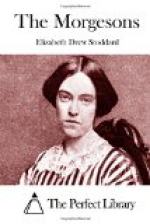“We might expect little from Fanny, perhaps; she saw her mother die in want, her father stern, almost cruel to them, and soured by poverty. Fanny never had what she liked to eat or wear, till she came here, or even saw anything that pleased her; and the contrast makes her bitter.”
“She is proud, too,” said Aunt Merce. “I hear her boasting of what she would have had if she had stayed at home.”
“She is a child, you know,” said Verry.
“A year younger than you are.”
“Where is the universal boy?”
“Abolished,” father answered. “Arthur is growing into that estate.”
“Papa, don’t forget that I am a veteran officer.”
“Here, you rascal, come and get this nice egg.”
He slipped down, went to his father, who took him on his knee.
“What shall I do first? the garden, orchard, village, or what?” I asked.
“Gardens?” said Verry. “Have they been a part of your education?”
“I like flowers.”
“Have you seen my plants?” Aunt Merce inquired.
“I will look at them. How different this is from Rosville?”
Then a pang cut me to the soul. The past whirled up, to disappear, leaving me stunned and helpless. Veronica’s eye was upon me. I forced myself to observe her. The difference between us was plainer than ever. I was in my twentieth year, she was barely sixteen; handsome, and as peculiar-looking as when a child. Her straight hair was a vivid chestnut color. Her large eyes were near together; and, as Ben Somers said, the most singular eyes that were ever upon earth. They tormented me. There was nothing willful in them; on the contrary, when she was willful, she had no power over them; the strange cast was then perceptible. Neither were they imperious nor magnetic; they were baffling. She pushed her chair from the table, and stood by me quiet. Tall and slender, she stooped slightly, as if she were not strong enough to stand upright. Her dress was a buff-colored cambric, trimmed with knots of ribbon of the same color, dotted with green crosses. It harmonized with her colorless, fixedly pale complexion. I counted the bows of ribbon on her dress, and would have counted the crosses, if she had not interrupted me with, “What do you think of me?”
“Do you ever blush, Verry?”
“I grow paler, you know, when I blush.”
“What do you think of me?”
“As wide-eyed as ever, and your eyebrows as black. Who ever saw light, ripply hair with such eyebrows? I see wrinkles, too.”
“Where?”
“Round your eyes, like an opening umbrella.”
We dispersed as our talk ended, in the old fashion. I followed Aunt Merce to the flower-stand, which stood in its old place on the landing.
“I have a poor lot of roses,” she said, “but some splendid cactuses.”
“I do not love roses.”
“Is it possible? But Verry does not care so much for them, either. Lilies are her favorites; she has a variety. Look at this Arab lily; it is like a tongue of fire.”




